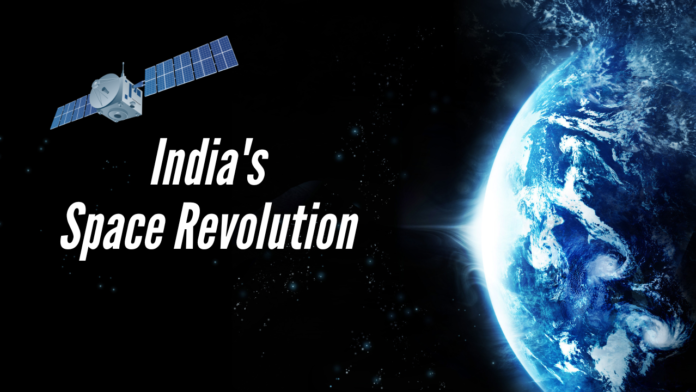From Chandrayaan-3’s lunar touchdown to pioneering zero orbital debris missions, India’s ISRO emerges as a beacon of sustainability and innovation, illuminating the path for the next generation of spacefarers.
Gethrude Kii, 28 March,2023:
In a significant milestone for India’s space endeavors, the Indian Space Research Organisation (ISRO) has been making waves on the global stage with a series of remarkable achievements that showcase the country’s commitment to innovation and sustainability in the space sector.
The recent recognition from the World Economic Forum (WEF) positions India as a beacon for smaller nations aspiring to venture into space exploration. Sebastian Buckup, a member of the Executive Committee at the Centre for Fourth Industrial Revolution (C4IR) in a recent interview with PTI highlighted India’s pivotal role, stating, “India is seen as a role model, a lighthouse for smaller, aspiring space nations, which also look to India for support.”
India’s space economy, valued at around nine billion dollars, is positioned to escalate to an estimated Rs 3,67,760 crore ($44 billion) by 2033, as indicated by the Indian National Space Promotion and Authorisation Centre (IN-SPACe). This surge in economic value underscores India’s growing influence in the global space economy and its potential to drive innovation and collaboration on a larger scale.
One of the standout achievements for ISRO has been the Chandrayaan-3 mission, which not only marked India’s successful landing on the Moon’s south pole on 23rd August,2023, by which PM Modi named the landing site ‘Shiv Shakti’ but also secured the prestigious US Aviation Week Laureates Award this week. The significance of this mission extends beyond mere exploration, as it solidifies India’s position as a global trailblazer in space technology and exploration.
Reflecting on the Chandrayaan-3 mission, Sripriya Ranganathan, Deputy Ambassador at the Indian embassy in the US reportedly, emphasized the mission’s success, stating, “The award noted Chandrayaan-3’s landing at the lunar South Pole, its confirmation of the presence of water there, as well as the presence of sulfur nearby — all at a cost of $75 million as tweeted by Indian Embassy on X!”
In addition, the International Astronomical Union (IAU) recognizing the name ‘Station Shiv Shakti’ for the landing site of Chandrayaan-3’s lander adds another feather to India’s cap in the realm of space exploration. The name ‘Station Shiv Shakti’ signifies the masculine and feminine duality of nature, symbolizing strength and resolution, echoing India’s rich cultural heritage.
Another remarkable feat by ISRO was achieved with the Polar Satellite Launch Vehicle (PSLV) undertaking a zero orbital debris mission on March 21. The success of the PSLV Orbital Experimental Module-3 (POEM-3) in re-entering the Earth’s atmosphere with minimal debris accumulation was hailed as “another milestone” by ISRO.
These zero orbital debris missions showcased ISRO’s commitment to sustainability in space activities, embodying a responsible approach towards space exploration. The transformation of the PSLV terminal stage into a stabilised platform, the POEM-3, stands as a testament to India’s dedication to innovation and technological advancement in the space sector.
The PSLV-C58/XPoSat mission, which facilitated this achievement, integrated nine experimental payloads to conduct technology demonstrations and scientific experiments. Partnerships with Non-Government Entities (NGEs) through the Indian National Space Promotion and Authorization Centre (IN-SPACe) played a critical role in the success of the mission.
The integration of startups, universities, and NGEs in space experiments through the POEM platform underscores ISRO’s commitment to promoting collaboration and innovation in the space sector. The development of new features and technologies within the POEM-3 mission opens up opportunities for academia and startups to experiment with space-borne payloads.
ISRO’s continuous efforts towards providing a cost-effective orbital experiment platform align with the global imperative to address space debris concerns. As multiple small satellite constellations emerge, the threat posed by space debris underscores the necessity for advanced debris tracking systems and responsible satellite deployment practices.
India’s ascent in the global space race is underpinned by a commitment to sustainability, innovation, and collaborative partnerships. With each mission and accolade, India cements its position as a trailblazer in the space sector, inspiring and paving the way for emerging space nations to follow suit.
In a world where space exploration holds the key to unlocking new frontiers and technological advancements, India’s journey in space stands as a testament to the country’s vision, dedication, and pioneering spirit in shaping the future of space exploration and technology.




